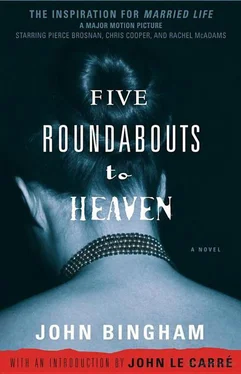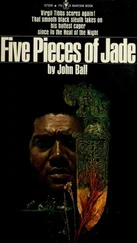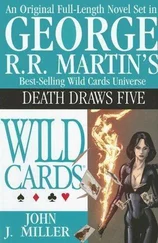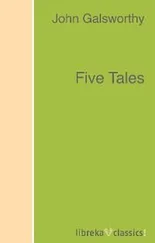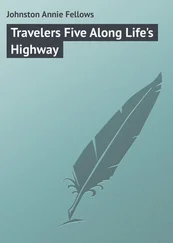John Bingham - Five Roundabouts to Heaven
Здесь есть возможность читать онлайн «John Bingham - Five Roundabouts to Heaven» весь текст электронной книги совершенно бесплатно (целиком полную версию без сокращений). В некоторых случаях можно слушать аудио, скачать через торрент в формате fb2 и присутствует краткое содержание. Жанр: Криминальный детектив, на английском языке. Описание произведения, (предисловие) а так же отзывы посетителей доступны на портале библиотеки ЛибКат.
- Название:Five Roundabouts to Heaven
- Автор:
- Жанр:
- Год:неизвестен
- ISBN:нет данных
- Рейтинг книги:4 / 5. Голосов: 1
-
Избранное:Добавить в избранное
- Отзывы:
-
Ваша оценка:
- 80
- 1
- 2
- 3
- 4
- 5
Five Roundabouts to Heaven: краткое содержание, описание и аннотация
Предлагаем к чтению аннотацию, описание, краткое содержание или предисловие (зависит от того, что написал сам автор книги «Five Roundabouts to Heaven»). Если вы не нашли необходимую информацию о книге — напишите в комментариях, мы постараемся отыскать её.
Five Roundabouts to Heaven — читать онлайн бесплатно полную книгу (весь текст) целиком
Ниже представлен текст книги, разбитый по страницам. Система сохранения места последней прочитанной страницы, позволяет с удобством читать онлайн бесплатно книгу «Five Roundabouts to Heaven», без необходимости каждый раз заново искать на чём Вы остановились. Поставьте закладку, и сможете в любой момент перейти на страницу, на которой закончили чтение.
Интервал:
Закладка:
The links in the chain were complete, except for one or two paltry bits of evidence which would come to hand at any moment. Who, then, should more properly finance her for a further few months than aunt Emily, who stood to gain so much?
Sometimes aunt Emily was a bit sticky about paying up. You could scarcely blame her. On such occasions the glass and the letters of the alphabet would come out at aunt Rose’s suggestion.
Everybody knew Bartels’ aunt Rose was psychic, because she said so herself, over and over again. Aunt Emily thought that she, too, was psychic, but she would admit in an awed tone that she was not nearly as psychic as aunt Rose.
So in due course, if her sister was being difficult about money, aunt Rose would arrange the letters in a circle around the little, highly polished mahogany table, and place the glass in the middle, and they would both place the tips of their fingers lightly on the upturned glass.
Thus they would sit in silence for a few moments; aunt Rose, untidily dressed, but intense and forceful; and aunt Emily dressed in her eternal bits and pieces, and black earrings, her cow-like eyes, utterly credulous, fixed watchfully on the glass.
Fortunately the spirits never kept them waiting long, largely because they knew, no doubt, that aunt Rose had so much work to do on her case.
I remember the last time I ever saw aunt Rose at work. It was a remarkably fine exhibition.
Aunt Emily had said she had not a penny more to spare for the moment. Not a penny. So after a tactful interval aunt Rose suggested having a turn with the glass. Aunt Emily could never resist it, though she ought to have known by bitter experience exactly what was going to be the end of it.
After the usual short wait, aunt Emily said, in her nervous way:
“Is anybody there? Who is there?”
For a second or two the glass remained immobile while aunt Emily stared raptly into space, her face twisted into the sort of welcoming smile which she imagined a spirit on a short visit to Bayswater might find reassuring. Then the tumbler began to move hesitatingly from letter to letter and spelt out: F-A-T-H-E-R.
“It’s Father!” cried aunt Rose triumphantly. He was, I may add, a frequent astral caller at the Bayswater house.
“Well, well,” said aunt Emily, trying to keep her voice normal, “what do you want, Father? Are you and Mother happy?”
The glass, gaining confidence, moved quickly.
“Y-U-S,” spelt out aunt Emily in a puzzled tone.
“He means ‘Yes,’ ” whispered aunt Rose, quickly separating the U and the E a little more, and replacing her fingers on the glass.
“B-U-T,” said Father, “I A-M,” and paused to think.
“What are you, Father?” asked aunt Emily.
“W-A-R-R-I-E-D.”
“Warried?” Aunt Emily looked at aunt Rose.
“Worried,” said aunt Rose. “Father’s worried. Why are you worried, Father?”
At this stage, aunt Emily should have been the one to be worried, but she never was. She just rushed blindly on to her fate. The answer was always the same:
“R-O-S-E’S C-A-S-E.”
“Rose’s Case,” said aunt Rose, and gave her sister a significant look. It was too late for aunt Emily to back out now without gross disrespect to the dead.
“H-E-L-P,” said Father succinctly, and added: “C-A-S-E W-I–L-L B-E W-O-N S-O-O-N.”
“Isn’t that wonderful!” whispered aunt Rose. But that was not the end; the sting was in the tail, and the glass now moved quickly and surely.
“M-O-N-E-Y N-E-E-D-E-D F-A-M-I–L-Y M-U-
S-T S-T-A-N-D F-O-U-R S-Q-U-A-R-E T-O-G-E- T-H-E-R.”
“How shall we get the money, Father?” asked aunt Emily though she ought to have known. Father seemed to try tactfully to side-step this for a moment, as though to break it gently. He just said: “F-I-G-H-T S-H-O-U-L-D-E-R T-O S-H-O-U-L-
D-E-R,” and was silent. It was as though he were brooding deeply over the whole problem.
Then, apparently having made up his mind, he added starkly: “E-M-I–L-Y M-U-S-T S-E-L–L S-O-M-E S-H-A-R-E-S.” Perhaps because he saw the blank look on aunt Emily’s face he added: “I-F N-E-C-E-S-S-A-R-Y.”
Just occasionally, my parents visited the house, and, once, a rather half-hearted attempt was even made to bounce some money out of my father, but being cynical he remained deaf to astral instructions and no further efforts were made.
Although I never felt sorry for Bartels’ aunt Rose, with her buoyant optimism and continual preoccupation with her great case, I did feel a certain pity for uncle James, her husband, the man around whom the whole case revolved.
He never struck me as having the air of a man who seriously considered himself to have been gravely wronged; indeed, he seemed to regard both the case and the astral messages with a certain good-humoured tolerance. But he was always very cagey when questioned as to his views on both subjects, probably because he held aunt Rose in some awe.
He was a short, well-proportioned man dressed invariably in the style of a country gentleman who had come up to spend an hour or two at Tattersall’s.
He wore loud check suits, usually grey, made of heavy cloth of such superb quality that though they had been made in the late Edwardian period, they still looked new; and on him, somehow, the style still looked smart. He always wore white socks, and, outside the house, grey spats, a brown bowler hat, and carried yellow gloves; his shoes shone like a well-polished Sheraton table. He had fair, thinning hair, a square jaw and straight nose, and keen, merry blue eyes.
One evening I saw uncle James’s car in front of the house; he was polishing the coachwork, whistling and hissing through his teeth like an ostler does when rubbing a horse down after a gallop. It was a very old car, but Bartels’ uncle kept it shining like a new pin.
“Hello, uncle James,” I said. He looked up.
“Hello, Peter!” He roared with laughter. He had the social habit common to his generation of going off into peals of loud laughter if he met somebody unexpectedly.
“How are you?” he said in his loud, cheerful voice. “Phil’s out at the moment, but he’ll be back soon.”
We chatted for a while and then made our way to the dreary expanse of coarse grass and dark green foliage behind the house, and walked up and down, discussing the sort of garden he would like to have, the vagaries of his car, and the scarcity of money, while a grimy-looking tabby cat sat on the wall dreaming of the infinite.
“How’s the case?” I asked at length.
“I believe Rose is up to some new dodge or other. This new lawyer fella was no good after all. Ah, well, it’s a poor heart that never rejoices,” he added.
“It certainly is.”
“I’d like to have a day out hunting before I die, I must say. I get tired of being the poor relation, Pete.”
He paused to light his pipe, sucking in the smoke with short, vigorous puffs, so that in a few seconds there was a thick cloud of acrid blue smoke around him.
It seemed odd that a man who had had charge of the destinies of a great regiment, who had been a local god to a thousand men, should be pacing up and down a seedy garden in Bayswater, dreaming of one last day out with the hounds before he died. He longed for a job, and it seemed to him bewildering that though he was over sixty, and untrained in anything except war, nobody would offer him one.
To the end of his days he never gave up hope, either of a job or of a last day’s hunting. He got neither, of course.
Uncle James helped daily with the housework, tended the garden, carried the coals, chopped wood, cleaned the shoes, and pressed his own clothes; he was always as immaculately clean as in the days when a batman had looked after him.
Читать дальшеИнтервал:
Закладка:
Похожие книги на «Five Roundabouts to Heaven»
Представляем Вашему вниманию похожие книги на «Five Roundabouts to Heaven» списком для выбора. Мы отобрали схожую по названию и смыслу литературу в надежде предоставить читателям больше вариантов отыскать новые, интересные, ещё непрочитанные произведения.
Обсуждение, отзывы о книге «Five Roundabouts to Heaven» и просто собственные мнения читателей. Оставьте ваши комментарии, напишите, что Вы думаете о произведении, его смысле или главных героях. Укажите что конкретно понравилось, а что нет, и почему Вы так считаете.
